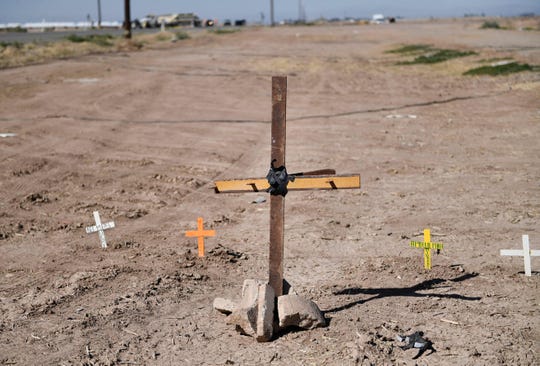‘She was running for her life’: Mother of 4 wanted new life in America. But she died in deadly crash near US-Mexico border
Carolina Ramirez Perez clambered into a car in the early morning hours of March 2, just south of the U.S.-Mexico border.
It was dark outside, packed inside. Nearly two dozen others crammed in with her. The seats had been ripped out, so the migrants perched on top of thick, black garbage bags that held their toothbrushes, clothing and documents to back up political asylum claims.
Fleeing domestic violence, the 32-year-old mother of four hoped to reunite with her children in Southern California later that day, according to court documents, a family memberand relief officials who spoke with USA TODAY.
But she did not survive the trip.
Ramirez Perez was among the 13 killed after that packed SUV collided with a semi-truck near the U.S.-Mexico border last week, Yadira Robles of the Imperial County Coroner’s Office confirmed to USA TODAY.
‘Dark realities of our immigration struggle’: Victims of deadly California crash should be focus of U.S. policy changes, leaders say
An image of the voter registration card of Carolina Ramirez Perez (Photo: Provided by Xiomara Corpeno)
The La Mixteca, Mexico resident was leaving an abusive relationship and planned to join her three children living in the U.S., ages 2, 5 and 10, according to two members of a Los Angeles County nonprofit that aids and advocates for indigenous communities.Her 14-year-old lives with her grandmother in Mexico. Santa Barbara court documents show the alleged abuse went back as far as 2012.
“We really don’t know what happened,” said Odilia Romero, co-founder and executive director of the organization, Comunidades Indígenas en Liderazgo (CIELO). “All we know is that she was running for her life, and now she’s dead.”
Ramirez Perez’s death has hit Romero hard because she sees people in similarly desperate circumstances regularly. Migrants wanting to get into the U.S. will pay human smugglers – known as “coyotes” – thousands to sneak them across the border.
“As we speak, people are being displaced and will want to cross the border to survive,” Romero said. That “pushes people to pay coyotes, who are always going to be there. They will not stop.”
Crosses are seen near the scene of a crash between an SUV and a semi-truck full of gravel near Holtville, California on March 2, 2021. (Photo: Patrick T. Fallon, AFP via Getty Images)
‘He was going to throw my body in the river’
Ramirez Perez “had a tragic life,” Romero said. While she was still in her teens, Ramirez Perez’ father pulled her out of school and married her against her will, Romero and a CIELO board member said. They crossed into the U.S. and worked in the fields of Santa Maria, a rich agricultural hub, as farmworkers, sending home money when they could to family who were taking care of their then-2-year-old daughter.
It was there that her husband, Martín Ruiz López, was charged with abusing her nearly a decade before she left him, Santa Barbara court records show. A 2019 statement obtained by USA TODAY says the abuse continued.
USA TODAY was not able to reach Ruiz López for comment via the municipal offices in the rural, mountainous region where he lives in Oaxaca or via an advocate who works with migrants in the area.
Ramirez Perez’s son also confirmed the alleged abuse to the newspaper La Opinión.
After Ramirez Perez had her first child, she and her husband crossed the border into the U.S., CIELO board member Xiomara Corpeño said.
In 2012, Ruiz López was arrested and charged with spousal battery, criminal threat with intent to terrorize, and trying to prevent or dissuade a witness by threat, according to records from the Superior Court of California, County of Santa Barbara. He pleaded guilty to the last charge, and the other two charges were dismissed.
That year, Ramirez Perez obtained a criminal protective order for domestic violence against her husband from the Santa Maria Police Department. In 2013 he was sentenced to 180 days in confinement and five years probation. He served 77 days in the Santa Barbara County Jail.
He was deported to Mexico after serving his sentence and, once home, allegedly forced her to return as well, Corpeño and Romero said.
Fearful, Ramirez Perez agreed and went home to Mexico, Corpeño and Romero said. There, she suffered “physical and psychological abuse” at the hands of her husband, according to a statement Ramirez Perez made to Mexican authorities in 2019.
The abuse went on for years, she said in the statement.
In 2019, however, Ramirez Perez decided to leave Ruiz López. She made a statement to the Tecomaxlahuaca municipal attorney, obtained by USA TODAY, that detailed alleged ongoing abuse by her husband and cited it as reason for separation. In the statement, Ramirez Perez told authorities she had come home one evening to find him drunk, threatening her with a gun.
Dijo “que me iba a tirar al río y que nadie se iba a dar cuenta de mi paradero,” she said in the statement. Translated In English, she said he told her that night he would shoot her and throw her body in the river, and that no one would ever know what had happened to her.
She left him then, she said in the statement. But she was still afraid.
Source: Read Full Article



